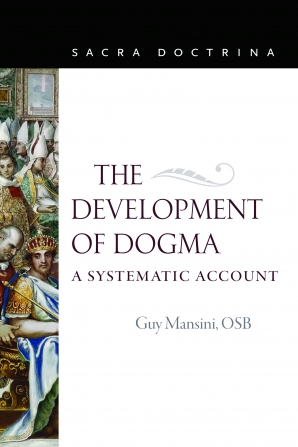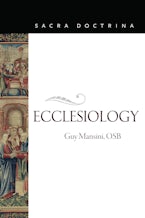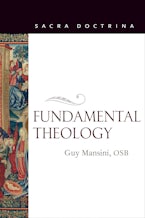- Home
- Sacra Doctrina
- religion
- The Development of Dogma
Preparing your PDF for download...
There was a problem with your download, please contact the server administrator.
The Development of Dogma
A Systematic Account
Sacra Doctrina
by Guy Mansini
Imprint: Catholic University of America Press
The Development of Dogma examines the nature of dogmatic statements and the causes of development. It devotes particular attention to the emergence of the form of dogmatic statements at the Council of Nicaea, but notes how this form is anticipated in the New Testament. It situates dogma and its development within the matrix of the great fundamental theological realities of Scripture, Tradition, and Magisterium. Fr. Mansini examines at some length how the Church comes to recognize a development as a genuine development rather than as a distortion of the word of God. The Development of Dogma is especially valuable today for its discussion and defense of the philosophical presuppositions of dogma, which are often simply presupposed but should not be ignored in a complete account of development. These presuppositions touch on fundamental philosophical issues, including the nature of knowledge, the objectivity and trustworthiness of names, and the various logical forms employed in understanding how development is related to a closed revelation. The historicity of human knowledge is also addressed, and the role of dogma itself in heading off the extreme relativism the historical nature of man is supposed to imply for ecclesial faith and life. The Church's dogma about dogma enunciated at the First Vatican Council is also examined. The role of certain fundamental concepts in understanding the possibility of the irreformability of dogma it speaks of is expressly addressed—concepts in principle accessible to all human beings and that enable a trans-cultural, trans-temporal proposal and reception of revealed truth.
Guy Mansini, OSB, is Max Seckler Chair of Theology at Ave Maria University (Florida), as well as the author of several books including Fundamental Theology and Ecclesiology.
"A serious work of theology undertaken by a well-respected theologian. Not everyone will agree with every detail of his proposal, but all will grant it a serious challenge to standard contemporary Catholic thinking on the topic."
~James Keating, Providence College
"How can Christian doctrine make progress into the future? What can help us tell a true development from a false development? Few theological questions are of equal importance in the Catholic Church today, when so many controversial issues connect directly to this one. In his historically-informed and systematically-engaging textbook, Guy Mansini offers students of Catholic theology a cogent and persuasive account of the meaning of doctrinal development which demonstrates an honest fidelity to our Christian past as much as a genuine concern for the present and future. Framed by careful attention to two key Councils of the Church, Nicaea and Vatican I, Mansini skillfully conducts his readers from the origin of dogma in the life of the Church to dogmatic reflection on dogma itself. Serenely attentive to the theological characteristics at the heart of development, he is likewise cognizant of what must be presupposed philosophically in any successful account of dogma and its progress. Students will find here a clear perspective and sure guidance through some of the most challenging and pressing questions in contemporary Catholic theology."
~Simon Francis Gaine, OP, Director, Angelicum Thomistic Institute, Rome
"This book is pedagogically superb. At a time when the ancillary philosophical principles and doctrines that go into a classical, Catholic theory of development have fallen out of fashion, Fr Mansini offers a refreshing explanation and defense of them. Without epistemic realism concerning propositional and conceptual content, we get into deep theological trouble, and Fr Mansini shows us why! The Development of Dogma deserves to be read by scholars, students, and concerned Catholic faithful who seek clarity on a topic that, in recent years, has been clouded by both the unnecessary abandonment of Aristotle and St. Thomas, and the unsuccessful appeals to modern and postmodern philosophies."
~Andrew Meszaros, St. Patrick's Pontifical University, Maynooth
"In an age when there is much debate as to what constitutes authentic doctrinal development, Guy Mansini, OSB, has authored an extremely relevant book, The Development of Doctrine: A Systematic Account. He provides a thoroughly Catholic theology of the development of doctrine, one that is creative and well thought out. He addresses the questions as to what constitutes faithful development and the way such doctrinal growth arises. Importantly, he offers philosophical and theological principles by which one can discern what is true development from that which is false, that is, attempts to alter the revealed truth of the doctrine itself. This book would be extremely helpful for every seminarian and pastor, including bishops."
~Thomas G. Weinandy, OFM, Cap., former member of the Vatican's International Theological Commission





